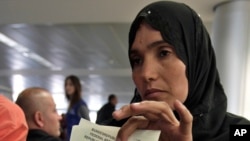The U.N. refugee agency (UNHCR) says an initial group of vulnerable Syrian refugees is leaving Lebanon for a new life in Germany.
The UNHCR said the 107 Syrians were due to fly to the German city of Hanover on Wednesday. It said they will be granted temporary asylum in the country under a special Humanitarian Admissions Program.
Resettlement program begins
Germany notified the U.N. refugee agency in March that it was prepared to receive up to 5,000 Syrian refugees on a temporary basis this year. The UNHCR said the German relocation program is the biggest of its kind for refugees from the Syria civil war.
UNHCR spokeswoman Melissa Fleming said that after the refugees arrive in Germany, they will stay in an accommodation center for two weeks. There, they will be given cultural orientation courses to help them integrate into their new surroundings. Those courses include basic language training and information on Germany.
After that, Fleming said the refugees will leave for their new homes in different parts of the country.
"They will be accommodated in small centers or apartments and will have full access to medical, educational, and other social services. They also have the right to work. This is a scheme under which they will receive residence permits for a period of two years. Should the situation continue unchanged or worse in Syria, then this could be extended," she said.
Fleming said Austria also has committed to taking 500 Syrian refugees for resettlement this year, while 10 other Western countries have pledged more than 1,650 resettlement places. She said the United States also has indicated that it might be willing to accept an unspecified number of refugees.
Fleming said the UNHCR aims to resettle 10,000 Syrian refugees under this temporary humanitarian program by the end of the year and to find 2,000 additional permanent places of resettlement for Syrians in acute need.
She acknowledged that the numbers are small considering the magnitude of the Syrian refugee crisis. But, she called it a start.
The UNHCR estimates that more than two million Syrians have fled their war-torn country. It believes that figure could reach three-and-a-half million by the end of this year. Four neighboring countries - Lebanon, Jordan, Iraq, and Turkey - are hosting most of the refugees.
Under pressure in Egypt
Several hundred thousand Syrians also have moved to Egypt as a refuge.
One of them, Wael Mustafa, arrived in Cairo last year. Within months, he had found work, a place to live and could support his extended family. But, two months after Mustafa last talked to VOA, Egyptian President Mohamed Morsi, a strong supporter of Syria's opposition, was ousted from power by Egypt's military. And everything changed.
"After Morsi [was toppled], I saw some Egyptian people look at us like we are not good people, we are bad people," Mustafa said.
Under Morsi, Egypt welcomed Syrian refugees as historic allies who backed a popular uprising much like the 2011 revolt that ousted his authoritarian predecessor, Hosni Mubarak. But, those Syrians have faced a backlash since Egypt's military-backed government began cracking down on Morsi's Muslim Brotherhood movement.
Activist Haitham Maleh, of the National Coalition of Syrian Revolution and Opposition Forces, said hundreds of Syrians in Egypt have been arrested by police or beaten in the streets, while others have been deported. Egyptian state media, he said, have just made things worse.
"Some media spoke in a very bad way against us. Some media say we are like Muslim Brotherhood - something terrorist. They think Free Syrian Army rebels are terrorists," said Maleh.
The Egyptian government also has adopted stringent new visa rules, making it harder for Syrians to find refuge in the country.
"Syrian people [previously] came to Egypt and their families would follow them. Now, [they] cannot, and [they] stay in Lebanon or Turkey or Syria. And some Syrian people go back to Syria."
Refugee crisis worries Lebanese
In Lebanon, the biggest regional host of Syrian refugees, the push toward a diplomatic solution over Syria's chemical weapons has produced mixed reactions.
Some Lebanese are relieved that the United States is reconsidering a Syria military strike that they fear would expand the Syrian civil war and refugee crisis. But, others criticized the delay in U.S. military action as the equivalent of offering support to the Syrian government.
Lebanese banker Nader Mashnouk, speaking to VOA as took a cigarette break in a Beirut shopping mall, said he is glad that Washington has delayed plans to attack Syria.
"Basically I'm more relieved. I feel safer. But I can't say for sure that I'm 100 percent safe because you never know what might happen," he said.
But, the head of a charity that provides free education to Syrian refugee children in Beirut said the only way to prevent President Assad from using chemical weapons against the Syrian people is to remove him from power.
Mohammad Khair al-Ghabani, chairman of Ibdaat, said the U.S. delay for diplomacy is a "conspiracy against the Syrian people" and that as the world waits, people are dying and the refugee crisis is growing.
Kamel Wazne, director of the Center for American Strategic Studies in Beirut, said a Western attack on the Syrian government would be offering de facto Western support to rebel groups, which include Islamist factions like al-Qaida.
If the United States is going to enter a war, he said, it should know which side it wants to win.
"They could be fighting a war and not even know who they are fighting. Then they shouldn't be in the war in the first place, because in war you have to have an objective," said Wazne. "Who's going to come next? Who's going to lead the country? How is the country going to be run?"
Reporting by Lisa Schlein in Geneva, Elizabeth Arrott in Cairo and Heather Murdock in Beirut.
The UNHCR said the 107 Syrians were due to fly to the German city of Hanover on Wednesday. It said they will be granted temporary asylum in the country under a special Humanitarian Admissions Program.
Resettlement program begins
Germany notified the U.N. refugee agency in March that it was prepared to receive up to 5,000 Syrian refugees on a temporary basis this year. The UNHCR said the German relocation program is the biggest of its kind for refugees from the Syria civil war.
UNHCR spokeswoman Melissa Fleming said that after the refugees arrive in Germany, they will stay in an accommodation center for two weeks. There, they will be given cultural orientation courses to help them integrate into their new surroundings. Those courses include basic language training and information on Germany.
After that, Fleming said the refugees will leave for their new homes in different parts of the country.
"They will be accommodated in small centers or apartments and will have full access to medical, educational, and other social services. They also have the right to work. This is a scheme under which they will receive residence permits for a period of two years. Should the situation continue unchanged or worse in Syria, then this could be extended," she said.
Fleming said Austria also has committed to taking 500 Syrian refugees for resettlement this year, while 10 other Western countries have pledged more than 1,650 resettlement places. She said the United States also has indicated that it might be willing to accept an unspecified number of refugees.
Fleming said the UNHCR aims to resettle 10,000 Syrian refugees under this temporary humanitarian program by the end of the year and to find 2,000 additional permanent places of resettlement for Syrians in acute need.
She acknowledged that the numbers are small considering the magnitude of the Syrian refugee crisis. But, she called it a start.
The UNHCR estimates that more than two million Syrians have fled their war-torn country. It believes that figure could reach three-and-a-half million by the end of this year. Four neighboring countries - Lebanon, Jordan, Iraq, and Turkey - are hosting most of the refugees.
Under pressure in Egypt
Several hundred thousand Syrians also have moved to Egypt as a refuge.
One of them, Wael Mustafa, arrived in Cairo last year. Within months, he had found work, a place to live and could support his extended family. But, two months after Mustafa last talked to VOA, Egyptian President Mohamed Morsi, a strong supporter of Syria's opposition, was ousted from power by Egypt's military. And everything changed.
"After Morsi [was toppled], I saw some Egyptian people look at us like we are not good people, we are bad people," Mustafa said.
Under Morsi, Egypt welcomed Syrian refugees as historic allies who backed a popular uprising much like the 2011 revolt that ousted his authoritarian predecessor, Hosni Mubarak. But, those Syrians have faced a backlash since Egypt's military-backed government began cracking down on Morsi's Muslim Brotherhood movement.
Activist Haitham Maleh, of the National Coalition of Syrian Revolution and Opposition Forces, said hundreds of Syrians in Egypt have been arrested by police or beaten in the streets, while others have been deported. Egyptian state media, he said, have just made things worse.
"Some media spoke in a very bad way against us. Some media say we are like Muslim Brotherhood - something terrorist. They think Free Syrian Army rebels are terrorists," said Maleh.
The Egyptian government also has adopted stringent new visa rules, making it harder for Syrians to find refuge in the country.
"Syrian people [previously] came to Egypt and their families would follow them. Now, [they] cannot, and [they] stay in Lebanon or Turkey or Syria. And some Syrian people go back to Syria."
Refugee crisis worries Lebanese
In Lebanon, the biggest regional host of Syrian refugees, the push toward a diplomatic solution over Syria's chemical weapons has produced mixed reactions.
Some Lebanese are relieved that the United States is reconsidering a Syria military strike that they fear would expand the Syrian civil war and refugee crisis. But, others criticized the delay in U.S. military action as the equivalent of offering support to the Syrian government.
Lebanese banker Nader Mashnouk, speaking to VOA as took a cigarette break in a Beirut shopping mall, said he is glad that Washington has delayed plans to attack Syria.
"Basically I'm more relieved. I feel safer. But I can't say for sure that I'm 100 percent safe because you never know what might happen," he said.
But, the head of a charity that provides free education to Syrian refugee children in Beirut said the only way to prevent President Assad from using chemical weapons against the Syrian people is to remove him from power.
Mohammad Khair al-Ghabani, chairman of Ibdaat, said the U.S. delay for diplomacy is a "conspiracy against the Syrian people" and that as the world waits, people are dying and the refugee crisis is growing.
Kamel Wazne, director of the Center for American Strategic Studies in Beirut, said a Western attack on the Syrian government would be offering de facto Western support to rebel groups, which include Islamist factions like al-Qaida.
If the United States is going to enter a war, he said, it should know which side it wants to win.
"They could be fighting a war and not even know who they are fighting. Then they shouldn't be in the war in the first place, because in war you have to have an objective," said Wazne. "Who's going to come next? Who's going to lead the country? How is the country going to be run?"
Reporting by Lisa Schlein in Geneva, Elizabeth Arrott in Cairo and Heather Murdock in Beirut.



